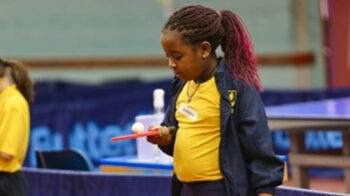INCLUSION IN SPORT
WOMEN AND GIRLS

Data tells us that there are significant inequalities that exist in Jersey for islanders to access sport and physical activity, particularly regarding gender.
The pronounced ‘gender gap’ is bigger in Jersey compared to England, with 9% less adult females regularly participating in local sport or physical activity every week than adult males.
England’s gender gap of just 1.5% can be attributed to the success of targeted initiatives like ‘This Girls Can’. Similarly, this trend is seen again in data involving children and young people, where on average girls are 6% less likely to be active in sport or physical activity than their male counterparts.
We are making strides to reduce this gap locally, with new data in 2023 showing us there is now just a 3% difference between boys’ and girls’ participation in physical activity, and similar trends in adult organised sport where the gender gap in Jersey has narrowed from 7% in 2021, to 3% in 2023. Much of this work can be attributed to initiatives run by local sports organisations that specifically target female participation. but whilst this is positive, there is still work to be done.
BARRIERS TO PARTICIPATION
- Feeling inadequate or intimidated
- Fear of judgement or harassment
- Lack of confidence to return to sport or try a new sport
- Body insecurities
- Embarrassment
- A lack of visibility and not seeing ‘people like me’
- Lack of free-time available for exercise
- Lack of childcare to be active without responsibility
- Poor or inadequate facilities e.g. changing facilities are not fit-for-purpose, surrounding environment not feeling like a ‘safe space’
- Lack of availability for female-only sessions or sessions led by female instructors/coaches
- Limited disposable income for clothing/kit, equipment or membership fees
- The physical and hormonal changes of the menopause
- Menstruation e.g. lack of knowledge of appropriate products to use during exercise
STRATEGIES TO ENCOURAGE PARTICIPATION
- Ask your participants how you can make your sport setting a safe, welcoming and inclusive environment for them to be and stay involved
- Offer female-only sessions or specific female-targeted programmes
- Provide session options with female instructors or coaches
- Consider the ‘atmosphere’ of your facility or venue around session times
- Support access to appropriate kit to help increase confidence and sense of belonging
- ‘Back to’ classes for a smooth return to the sport for previous participants, e.g. Back to Netball
- Female focused promotion/messaging with the use of female role models
- Reframe language and attitudes towards sport and physical activity, for example, instead of “it is unhealthy not do so sport and I’ll be unfit if I don’t do any exercise”, try “I know it will be enjoyable and I’ll get something valuable out of getting involved”
- Consider different motivators for getting females active and use this as a key incentive to welcome them into your sport setting e.g. social benefits, sense of achievement, support and friendship, fun, performance
- Use of venues close to other important hubs of activity e.g. shops and schools
- Timings that fit with different routines e.g. before/after work, weekend mornings, later evenings after children’s bedtimes
- Consistent sessions which allow for flexible and fluid participation
- Taster sessions/courses for beginners that don’t require lengthily commitments
- Family sessions
ADDITIONAL SUPPORT, RESOURCES AND TRAINING
- What is Gender Budgeting? – Women in Sport
- Getting started | This Girl Can
- The Enjoyment Gap: 4 Action Areas – This Girl Can (sportengland-production-files.s3.eu-west-2.amazonaws.com)
- Gender | Sport England
- Research report: Barriers to Sports Participation for Women and Girls – Women in Sport
- Research Report: Menopause, Me and Physical Activity – Women in Sport
- Sport, Stereotypes and Stolen Dreams: Why girls still feel they don’t belong in sport – Women in Sport
- Home | Studio You (studio-you.co.uk)
- How elite women’s sport impacts girls’ ability to dream – Women in Sport
- Move Her Mind | ASICS US
- Puberty & Sport: An Invisible Stage- Under Pressure on Vimeo
- Go Where Women Are – Insight on engaging women and girls in sport and exercise
- Families – Working with families to be physically active together
- Families Fund – What works (delivering sport and physical activity to families)
- Benefits of working with families for the sports and physical activity sector
